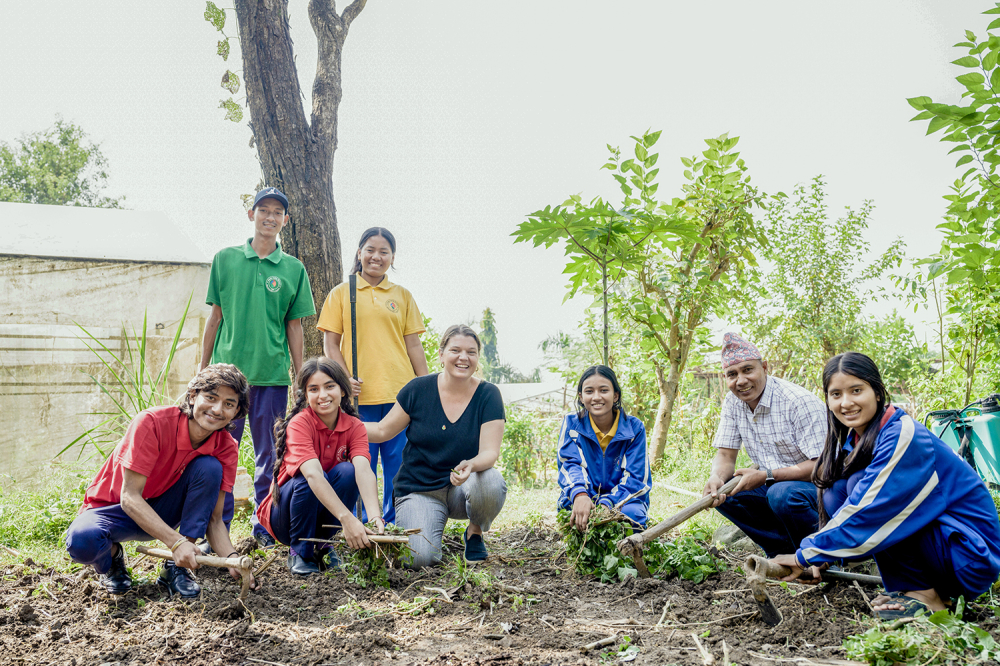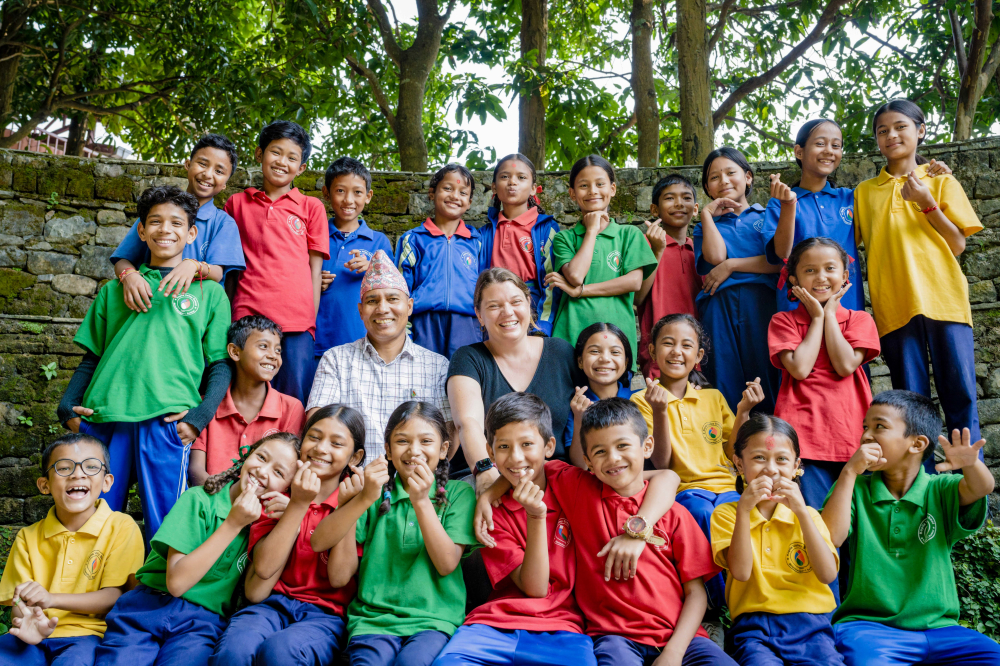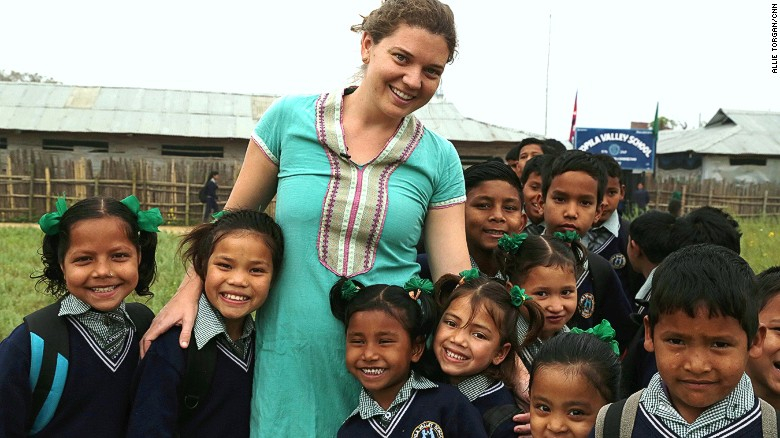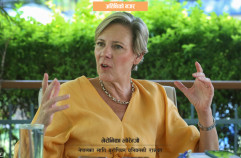"Love songs by Vipul Chhetri, Sajjanraj Vaidya and Sushant KC"
We use Google Cloud Translation Services. Google requires we provide the following disclaimer relating to use of this service:
This service may contain translations powered by Google. Google disclaims all warranties related to the translations, expressed or implied, including any warranties of accuracy, reliability, and any implied warranties of merchantability, fitness for a particular purpose, and noninfringement.


Maggie Doyan from the state of New Jersey, USA, has dedicated her life to the education of children and the welfare of women, focusing on Nepal. During her visit to India in 2005, she came here after meeting Nepali citizens. Since then, she has been doing social service by making Surkhet her work area. She believes that everyone has the power to change the world in the blink of an eye.



That is why she named her organization 'Blinknow Foundation'. Author of Between the Mountain and the Sky: A Mother's Story of Love, Loss, Healing and Hope, Maggie is the Co-Founder and Chief Executive Officer (CEO) of the BlinkNow Foundation. The team of co-founder Tope Mall and Maggi is providing free education to more than 600 students. Kopila is providing free accommodation and meals to more than 70 children through the Valley School and Orphanage.
Maggie reaches out to communities to eradicate poverty, empower women, improve health and promote sustainability and social justice. She has been working in the field of children and women for a long time and has been honored with the 'CNN Hero of the Year Award' in 2015. Edited part of the conversation of Jagdishwar Pandey from Kantipur with Maggie, a social worker:
When did you come to Nepal for the first time?
My trip to Nepal was unexpected. I was visiting India. There I got a chance to meet a Nepali. I was very impressed with his warm heart and emotional connection. From him, I also heard the stories of Nepalese sufferings, dreams and the tragic journey from Nepal to India.
 Every story of Nepali touched my heart. I wanted to see and experience Nepal myself. When I came to Nepal and reached Karnali, it felt like coming home in a way I had never experienced before. I was so captivated by the beauty of the land and the strength of the people that I decided to stay here. I have been living in Surkhet for a long time which has become an important hub as the provincial capital.
Every story of Nepali touched my heart. I wanted to see and experience Nepal myself. When I came to Nepal and reached Karnali, it felt like coming home in a way I had never experienced before. I was so captivated by the beauty of the land and the strength of the people that I decided to stay here. I have been living in Surkhet for a long time which has become an important hub as the provincial capital.
You must have met many people while doing social work in Nepal. How do you feel Nepali?
People get excited when they go to any corner of the world and tell about their experience in Nepal. The greatest thing about Nepal is its people. They are kind, friendly and respectful towards others. There is a spirit of cooperation and helping each other here, which I really appreciate. I also consider myself grateful to be a part of it. Living among the Nepali people, feeling their warmth and generosity is an amazing experience. I also feel incredibly humbled and honored to be a part of the Nepali community.
Nepal's opinion about weather here?
I live in Surkhet and love the weather here. It's almost always sunny here, making it a great place for family walks, cycling and evening walks with the kids. Here I feel somewhat difficult because of the heat in the months of June and July. I am a bit scared about the recent dengue outbreak here.
What is your favorite Nepali food?
My favorite Nepali food is dal-rice. I eat dal-rice for lunch every day. I have been living in Nepal for so long that I long for dal and rice for lunch. Even when I am in America and Canada, I make dal and rice for dinner once or twice a week. Jumla beans are of course excellent to eat as pulses. I absolutely love sesame pickles, radish pickles and fresh curds. Just remembering these foods makes my mouth water.
How have you seen Nepali customs? Favorite Nepali behavior here?
One thing that deeply touched my heart during my stay in Nepal is the behavior here. Here they address each other as family members by using words like sister-sister, brother-brother, uncle-aunt, mother-sanima. Such relationships make everyone feel connected. I think this is a very beautiful thing.
 When reminding that we are all part of one human family, at this age of 37, the word sister-sister seems very respectful. The word is also a touching reflection of respect and relationship. I value this word deeply. It speaks to the community and collaboration that thrives in Nepal, which makes every moment here feel like being surrounded by an extended family.
When reminding that we are all part of one human family, at this age of 37, the word sister-sister seems very respectful. The word is also a touching reflection of respect and relationship. I value this word deeply. It speaks to the community and collaboration that thrives in Nepal, which makes every moment here feel like being surrounded by an extended family.
Your favorite Nepali festival?
Among the festivals here, I like Dasain very much. This festival also adds excitement to our young children. In fact, festivals like Dasain celebrated here enliven the mind. The sky full of kites, bustling markets and precious moments spent together as a family make it incredibly special.
Tihar celebrated here is also my favorite festival. I especially love the light of the lamps lit during the festival. Deusi-Bhailo, who comes from house to house and dances and sings, also gives a special joy. It feels like a magical experience unlike any other. The festival of Holi celebrated here is also wonderful. This festival is also celebrated with love and colors.
How much Nepali do you speak?
I can speak the Nepali language spoken in West Nepal. However, that may include my American accent. I am working on improving my language skills and pronunciation. My children speak Nepali language like their Nepali brothers. It even makes me a little jealous sometimes, to be honest.
Your favorite Nepali song?
Nepali music fills our home with joy. And, the background of our daily life is like music. Here we listen to Nepali music from traditional folk tunes and bhajans to modern rap. I also love Nepali love songs. I find that Nepali songs have a wonderful ability to touch the heart. My favorite musicians are Vipul Chhetri, Sajjanraj Vaidya and Sushant KC. My kids love their songs too. And, they always play the guitar and sing the songs sung by them. It's amazing to see how music brings us all together.
How knowledgeable are you about Nepali literature? Your favorite Nepali literary work?
I really liked 'Karnali Blues' written by Budhisasagar. I was also surprised to read the depiction of Karnali in it. My friend Dr. who was published last year. Navraj KC's 'The Price of Zero' is equally poignant.
How often do you watch Nepali movies?
My children are big fans of Nepali movies. However, I have to admit, when the TV is on, then my house gets a little quieter. I enjoy that quiet moment but I usually don't like to watch a lot of TV.
Favorite place in Nepal you have visited?
I have been to many places in Nepal. Karnali has a special place in my heart. It is also a beautiful cultural area. However, it does not attract the attention of many tourists. My first trip to Nepal was to Kalikot in Karnali and it completely captivated me. There is something about the culture, the beauty here, that makes it my favorite place in Nepal.
What is your opinion about Nepali art and culture?
It is very inspiring to see the emergence of 'Made in Nepal' brands that respect and celebrate our local crafts, arts and goods. I fully support the movement to use materials produced in Nepal and not to bring large quantities of materials produced abroad into Nepal.

Feels like we can get back in touch with our grassroots by embracing the beauty of our traditional practices in everything from clothing and fashion to everyday objects, while being sustainable and eco-friendly.
It's great to see our students starting their own enterprises and the women of our Women's Center producing beautiful products by hand. The 'Made in Nepal' campaign is a return to the appreciation of sustainable craftsmanship, which I respect wholeheartedly.
प्रकाशित : चैत्र २, २०८० ०८:२२







!['आधिकारिक जसपा नेपाल हामी नै हौं' [अन्तर्वार्ता]](https://assets-cdn-api.ekantipur.com/thumb.php?src=https://assets-cdn.ekantipur.com/uploads/source/news/kantipur/2024/third-party/manish-suman-0552024052003-1000x0.jpg&w=241&h=158)
!['अध्यक्ष यादवको निरंकुश शैलीविरुद्ध नयाँ कदम' [अन्तर्वार्ता]](https://assets-cdn-api.ekantipur.com/thumb.php?src=https://assets-cdn.ekantipur.com/uploads/source/news/kantipur/2024/third-party/rajendra-shrestha-0652024045211-1000x0.jpg&w=241&h=158)








